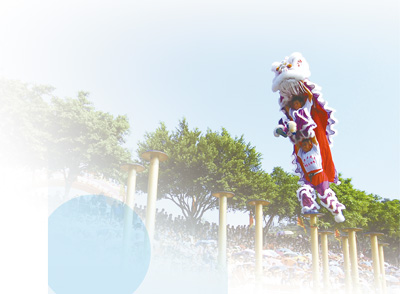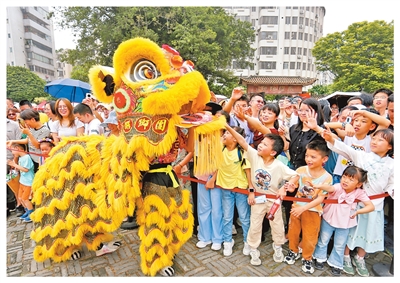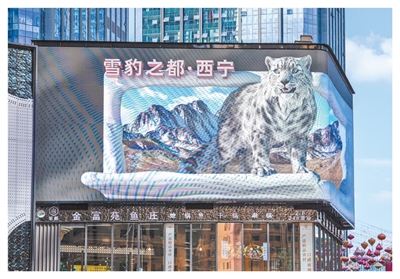Cultural IPs: New calling cards for cities to stand out
From:People's Daily OnlineAuthor: 2025-08-11 16:43
Shenyang integrates comedy into urban identity and tourism development
The Second China (Shenyang) Comedy Film Week recently took place in Shenyang, northeast China's Liaoning Province, drawing professionals and visitors alike.
Screenwriter Zhong Yiming, who attended multiple activities during the comedy film week, expressed deep pride in his hometown, declaring that Shenyang is now widely recognized as a "stronghold of comedy."

A tourist takes a selfie at the Shenyang Zhongchen film town cultural industry park in Shenyang, northeast China's Liaoning Province. (Photo courtesy of the Shenyang Zhongchen film town cultural industry park)
In recent years, Shenyang has continuously enhanced its comedic identity by hosting the comedy film week and integrating themed activities with cultural tourism resources and commercial venues. This strategic approach has created a distinctive cultural intellectual property (IP) while steadily reinforcing the city's reputation as a comedy hub.
During the film week, the Shenyang Zhongchen film town cultural industry park, the venue for this year's event, welcomed more than 10,000 tourist visits daily.
On the opening day of the film week, Liaoning Province announced new measures to promote the high-quality development of the film industry, including support for scriptwriting and rewards for low-budget films, with maximum funding reaching 10 million yuan (about $1.4 million).
In addition, the Publicity Department of the Communist Party of the China Shenyang Municipal Committee launched a comedy film industry alliance in collaboration with multiple organizations.
Foshan revives lion dance heritage to express its spirit
At Tianhu Park in the Xiqiao Mountain scenic area in Nanhai district, Foshan, south China's Guangdong Province, 82 piles of varying heights rose from the water. Two lion dancers leapt onto the piles, performing thrilling maneuvers on the 20-centimeter-diameter tops to thunderous applause from spectators.

Photo shows a scene of a lion dance performance at Tianhu Park in the Xiqiao Mountain scenic area in Nanhai district, Foshan, south China's Guangdong Province. (Photo courtesy of the Publicity Department of the Communist Party of China Nanhai District Committee)
This lion dance cultural performance competition has continued for more than two decades. Lion dance originated in Foshan and serves not only as an important symbol of Lingnan folk culture but also as a significant cultural identifier for Foshan residents. The Guangdong Lion Dance was included in the first batch of China's national intangible cultural heritage list in 2006.
Foshan currently boasts thousands of folk lion dance troupes that perform during festivals and temple fairs. Its cultural IP elements, including Foshan kung fu and lion dance, vividly illustrate the city's spirit of "daring to think big, take action, and make pioneering efforts."
Xiqiao town has been designated as "China's famous town of dragon and lion dance" by the General Administration of Sport of China. At the foot of Xiqiao Mountain, lion dances are performed daily at the Wong Fei Hung Lion Dance Martial Arts Museum.
Throughout Xiqiao town, dragon and lion culture has taken root in schools and communities, with virtually every village maintaining its own lion dance troupe. Lion dance exercises have also been promoted in Foshan's primary and secondary schools, becoming a distinctive local cultural activity.

Tourists interact with a lion dance performer at a block serving tourism and leisure in Chancheng district, Foshan, south China's Guangdong Province. (Photo/Huang Jiming)
Foshan has made notable efforts to combine its cultural stories with sports and the film and TV industry by leveraging its cultural IPs. The city has launched branded competitions on lion dance, innovative communication channels, and experiential settings to attract engagement across age groups. It has also used culture to drive cultural tourism, developing tourism performances and the film and TV industry.
Nanhai district has implemented action plans for the innovative development of dragon boat and lion dance culture, aiming to tell compelling dragon and lion stories while promoting the city's image.
Xining embraces snow leopard imagery to promote ecological tourism
At the Xining Wildlife Park in Xining, northwest China's Qinghai Province, snow leopards attract thousands of visitors and have become a calling card for the city.
The park serves as China's only snow leopard breeding and research base. Currently, around 20 snow leopards are publicly exhibited in China, with 12 housed at the park, according to Qi Xinzhang, deputy director of the Qinghai wildlife rescue and breeding center. Aside from the three born through captive breeding, the rest were rescued from the wild.
Beginning in 2024, Xining has been exploring the comprehensive integration of snow leopard culture with tourism activities encompassing sightseeing, recreation, shopping, education, fitness, and entertainment.

A naked-eye 3D video featuring snow leopards is displayed on a large outdoor screen in Xining, northwest China's Qinghai Province. (Photo/Hai Long)
Leveraging the Xining Wildlife Park, the city has developed customized routes and products that combine education and tourism, as well as ecology and tourism.
Aiming to become a central city for a destination of international eco-tourism, Xining has deeply explored distinctive local cultural elements to cultivate its brand as the "Snow Leopard Capital."

Children pose for a picture with a stand featuring snow leopard elements in Xining, northwest China's Qinghai Province. (Photo/Hai Long)
In Xining, snow leopard-themed products are ubiquitous, including naked-eye 3D videos of snow leopards, dolls, fridge magnets, cushions, handbags, and postcards.
"We have designed 26 snow leopard-related cultural and creative products, promoting them through key cultural tourism activities, continuously generating economic benefits and increasing their popularity," said Chen Jingyu, an official from the Publicity Department of the Communist Party of China Xining Municipal Committee.
Edit:董麗娜
The copyright of the article and the picture belongs to the original author. If there is any infringement, please contact to delete it